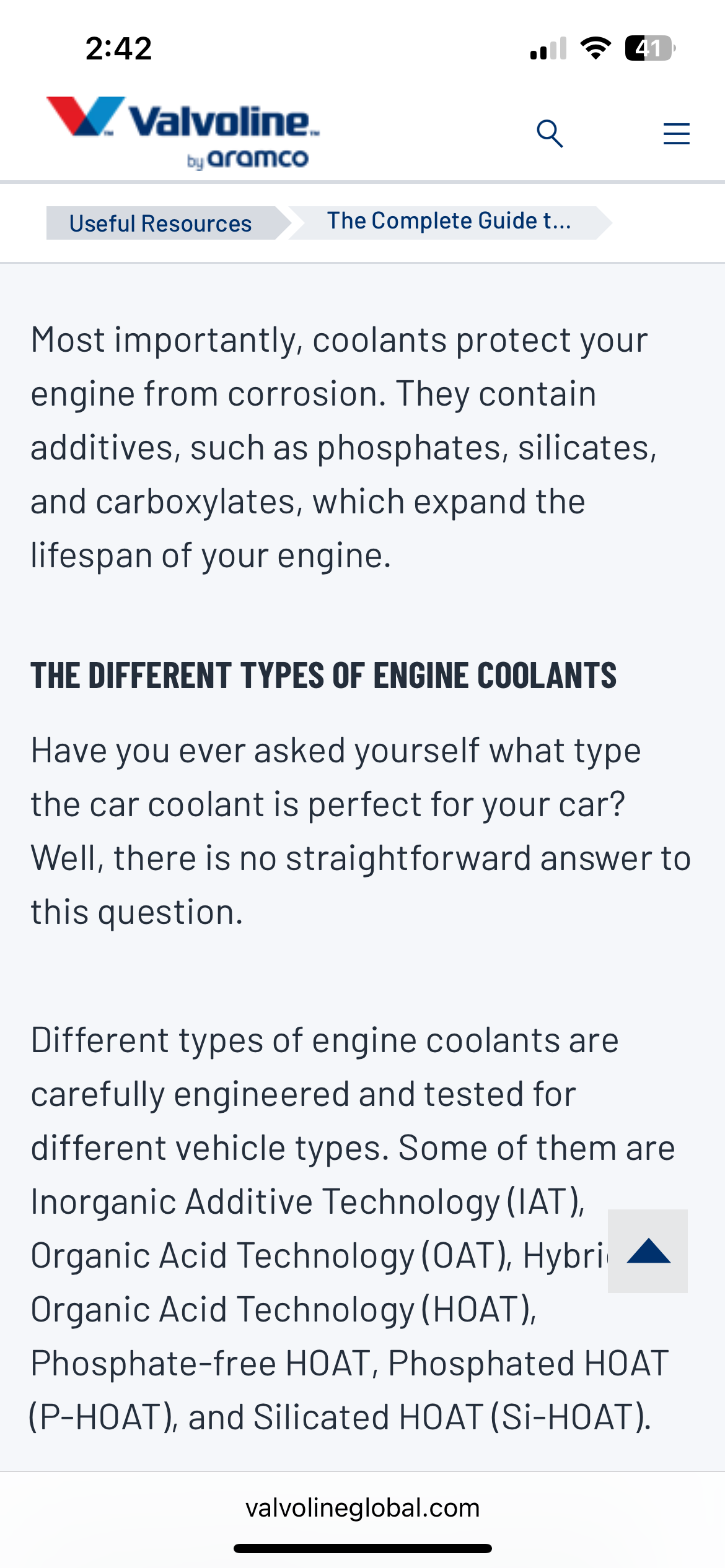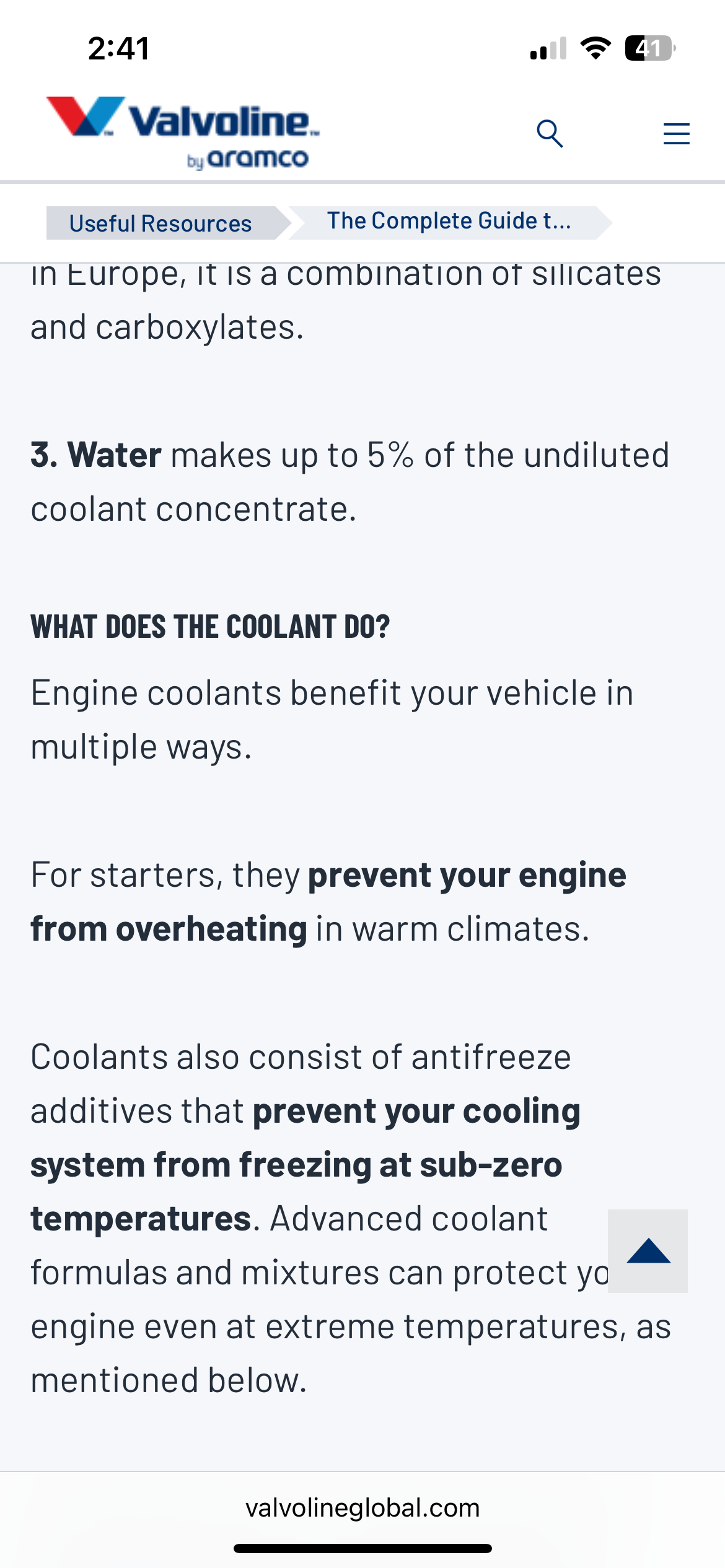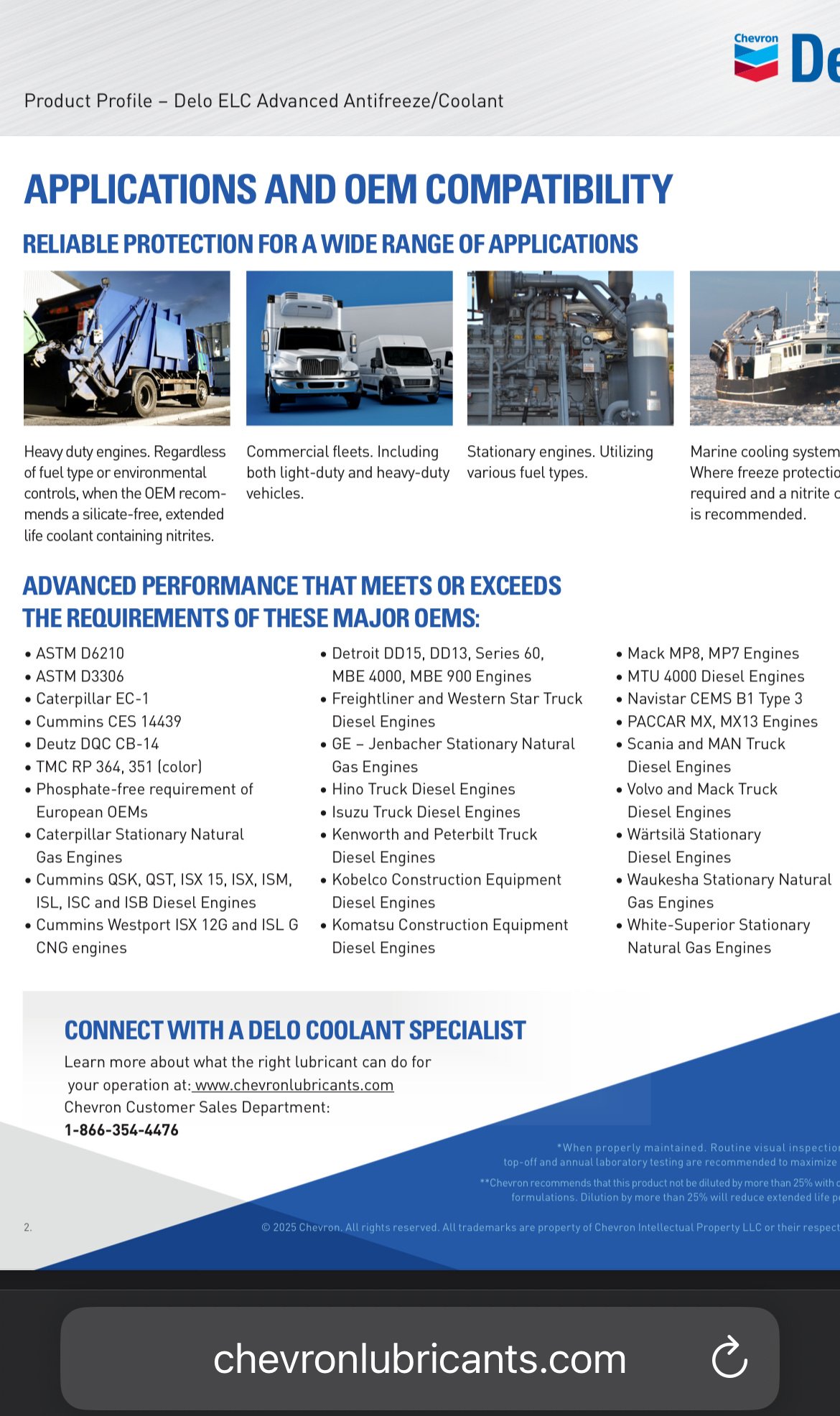Antifreeze

There a good reason a guy can't run truck antifreeze in a boiler?
Google talks about it being "toxic" like people are drinking boiler water or something. It's no worse than draining a truck's cooling system, which gets done every so often.
It's much cheaper, lasts longer and transfers heat better than propylene glycol (DowFrost, TriaFrost, NoBurst, etc). I don't see a downside.
Setting up used-oil boilers that'll be outdoors (in a connex), and eventually probably a snow melt slab so need freeze protection. IE if boiler trips on safety, could go cold before it's able to be worked on.
Comments
-
Because it is toxic and there's a chance of it getting into the potable water supply.
Your talking pennies
0 -
ethylene glycol is more thermally conductive than PG
Dowfrost is a PG, Dowtherm is EG both are used in hydronics. EG is a bit more toxic.
EG is used when there is no potential for contact with potable water. Skating rinks, large chilled water systems for example
Automotive glycols containe silicates which can sludge a hydronic system. Do not use automotive PG or EG in hydronics
Do not use RV antifreeze, no inhibitors
Always label the system indicating the type of fluid and the date.
Bob "hot rod" Rohr
trainer for Caleffi NA
Living the hydronic dream3 -
Automotive and truck antifreezes all contain a variety of chemicals besides one of the glycols which are matched to the particular engine in which they are to be used. These are all startlingly toxic. Worse, various automotive antifreezes are not necessarily compatible with each other — or with engines from other makers. What works well in an aluminium block, for instance, is very likely to cause real damage in a cast iron block — and vice versa (there are a few, pricey, general use antifreezes, but those are for emergency use).
Br. Jamie, osb
Building superintendent/caretaker, 7200 sq. ft. historic house museum with dependencies in New England0 -
Definitely not pennies.
Delo ELC runs me about $7 a gallon for 50/50. TriaFrost PG 50/50 is about 3x that.
So a system holding 20 gallons would cost $140 vs $400.
0 -
-
Aside from pouring it down the well, there's no way it could get in the water pipes. The heat pipes aren't even near any water pipes.
0 -
Not sure why you'd think I'd make a cocktail of different antifreeze but most are compatible, though not ideal to mix.
There's no modern automotive antifreeze I know of that isn't safe for steel, cast, copper and aluminum as those are all typical metals in cooling systems.
Silicates haven't really been a thing in coolants in over 25 years. That would be IAT coolant you're thinking of. Old school early 1990s and before green "prestone"
0 -
Thats exactly HOW accidents happen………………Theres NO way!
0 -
Does your boiler have a makeup water connection? If it does, if the backflow preventer were to fail then the ethylene glcol could contaminate your drinking water. Google Ethylene Glycol poisoning to see why that's a bad idea.
If you don't have a makeup water connection, and you fill it from a water supply not connected to your drinking water — like a utility pump in a 5 gallon bucket — there shouldn't be risk.
0 -
-
No, filled from pump and container. No domestic water is involved.
Has a low water cut off.
0 -
I didn't say it doesn't exist. I said it hasn't been common in many years... IE MOST current antifreezes aren't using silicates. I don't know about all as there's probably hundreds available nowadays. I'm mostly familiar with Chevron as that's the products I've been trained on.
Regardless, the Delo ELC I mentioned, (which I run in almost everything) is silicate free.
0 -
use what you want.
0 -
Not pennies when there isn't any advantage to it.
Aside from me deciding to unalive myself with drinking boiler water with antifreeze in it, not any worse than the 20+ vehicles and equipment on my land with ELC in their cooling systems. I haven't desired that red kool-aid yet. 🤣
0 -
-
If you use it I think it is fine but do not trust a backflow preventer. Do not make any connection between the boiler system and the potable water.
Do not put a pressure reducing valve on the system.
Fill the system with a hose connection and then disconnect the hose.
We did this on many systems and it worked fine regardless of the type of glycol used.
1 -
hydronics glycol is blended for hydronic use. The inhibitors and additives protect copper, brass, iron, aluminum and are comparable with seal materials used in hydronic valves .
Would you use hydronic antifreeze in your vehicles if it was cheaper than automotive products?
Over the years I have had 4 different glycol manufacturers on Coffee with Caleffi webinars. They all cautioned against automotive glycol in hydronic or solar DHW systems.
If the various uses were similar why would manufacturers make two different blends for automotive and hydronics? Why not make an all purpose antifreeze.
Why not ask Chevron for a letter indicating the automotive antifreeze as safe or legal, or acceptable to use in hydronic systems, they should know?
EG hydronic glycol is available but potable water needs to be isolated with double wall, vented heat exchangers or Indirects
.
Bob "hot rod" Rohr
trainer for Caleffi NA
Living the hydronic dream1 -
There's no connection between heat system and water system.
0 -
I meant Ethanol is ok IMHO not Automotive.
0 -
-
-
Go ahead and use whatever you want. Good luck chasing leaks, sludge, and getting any warranty out of anything over a couple bucks. I just replaced most of a system on Thursday that had new 50/50 put in it 3 years ago and had more than a dozen leaks, including pinholes in the cast iron pump body. This guy spent almost $6000 to fix what could have been solved by spending $300 more on the proper glycol.
0 -
No idea what he used, but there's tons of cast iron in automotive cooling systems. As well as copper, stainless, aluminum, even steel.
I can't think of anything in a boiler system that's special.
Just by chance I got an order for 1000 gallons of ELC yesterday, for a heating system. Said they've been running it ~20 years without an trouble. Just flush it every 5-6 years. We do 60/40 blends, but regularly gets to -60* at work.
There's no warranty. Used boiler. I've got spares too. Picked up 3 and only really need 1, though plan to install 2 for redundancy.
I'll have under $1000 in the whole system.
0 -
I don't make a habit of suing myself. That'd be an interesting court case!
Would only be me to get sick, but don't see how that could be possible. Like I've said probably 5 times now it's not tied to any drinking water source. I don't even drink the faucet water direct anyhow, have an RO filtration unit.
Either way, haven't seen any very useful info aside from "no"... OK, why?
IIt'll sludge up, cause leaks, shoot your dog and steal the truck... yeahhhhh. 🤣🤣
Makes no sense when automotive cooling systems aren't leaking all over or sludging up. Obviously need to drain and refill every 7-10 years.
(FWIW the old school green antifreeze, if any of you still use that, it only good for about 3 years)
0 -
-
-
-
so you connected with a Delco Coolant Specialist and they said it us approved and recommended for hydronics?
If not, why not?
Can you post their response?
Bob "hot rod" Rohr
trainer for Caleffi NA
Living the hydronic dream0 -
Their tech line is generally not helpful.
In fact their "experts" have called one of our grey beards for answers, when it was him calling them for info 🤣🤣🤣. He's been with the company since the 80s and reads and deeply understands and remembers spec books for fun.
Grey Beard said he couldn't think of any issues, that a heating system is far less demanding than in automotive use. He thinks the "don't use" is due to wanting no liability on the toxic aspect. That it's very common to drain boiler water to the ground. And lot of systems are tied to drinking water.
Just easier to say "NO, BAD, NO!"
0 -
there you go
your right!0 -
Hmmm. Well, if you are strictly the only user. No family, guests, etc. I guess you are in the clear. No need for concern??
0 -
Not sure why there would be.
0
Categories
- All Categories
- 87.5K THE MAIN WALL
- 3.3K A-C, Heat Pumps & Refrigeration
- 61 Biomass
- 430 Carbon Monoxide Awareness
- 122 Chimneys & Flues
- 2.1K Domestic Hot Water
- 5.9K Gas Heating
- 117 Geothermal
- 170 Indoor-Air Quality
- 3.8K Oil Heating
- 78 Pipe Deterioration
- 1K Plumbing
- 6.6K Radiant Heating
- 395 Solar
- 15.9K Strictly Steam
- 3.5K Thermostats and Controls
- 57 Water Quality
- 51 Industry Classes
- 51 Job Opportunities
- 18 Recall Announcements








